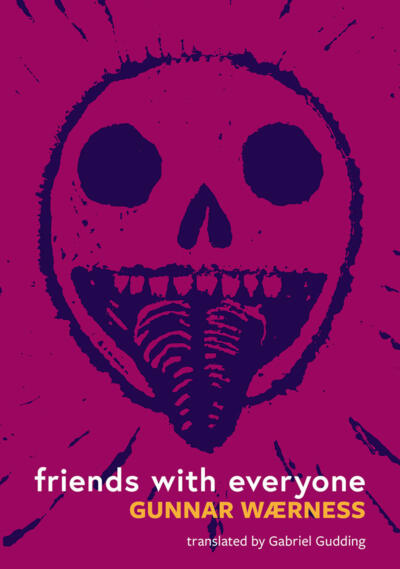
Friends with Everyone
by Gunnar Wærness
Translated by Gabriel Gudding
ISBN: 978-0-900575-21-1 | 253 pages | $20.00 | Release Date: April 15, 2024
“the tongue says it’s cramped inside humanity
it no longer wants to participate in the face”
Leading Norwegian poet Gunnar Wærness has been called a “punk” poet and a “wizard” whose poetry is a “vortex of precision and musicality” that moves in “surprising, disturbing and at times incomprehensible ways.” With Friends with Everyone, Wærness has written a monstrous book about spirit, speech and empire, migration and grief, belonging and freedom, language attrition and the ideological capture of literature. Filled with psychopomps, ghouls, giants, medieval song, the heron of forgetfulness, stepfamilies, flowers confiding in us, and babies speaking from bonfires, it is suffused with a gothic panpsychism. Translated by poet Gabriel Gudding with an ear attuned to the absurdities of intimacy, and vice versa, Friends with Everyone may just tell the story of speech itself.
Praise for Friends with Everyone
After I finished reading these poems, the lines would come to mind for days; this poet’s conversation gets into everything. Gunnar Wærness unveils the mechanics of worldbuilding as not metal and plastic but flesh and imagination at its worst and best! As a child, I sat in church, wishing for a different kind of poetry read from the pulpit; maybe this book, “spiritwords i’m heard / by others who turn / to see you spirit.” Oh yeah! Everyone I know will hear about this extraordinary collection from the poet who brilliantly turns us around page after page!
— CAConrad
Friends with Everyone reads like a diary of a supernova, leaving a trail of spectacular voices through which Gunnar Wærness channels a deluge of planetary events of the human, inhuman, and nonhuman. The translator Gabriel Gudding has beautifully recaptured Wærness’s inimitable tone and panoptical vision of our flailing planet.
— Don Mee Choi
Friends with Everyone, translated from the Norwegian by Gabriel Gudding, addresses the pretenses of Enlightenment humanism and whatever vestiges of the human remain visible under the rubble of late capital. Treating the poetic line as a vector (in every sense of the word), a kind of pre-print Dickinson sans dashes, Wærness rummages through the detritus of what David Grundy calls our present continuous, a series of distended crises.
—Tyrone Williams
Gunnar Waerness’s poems are a new kind of Viking funeral. They slash and burn a tribalism that sees the surf as “the mother of all borders.” With a “big strong tonguemuscle” they sputter and croak and shout a restless dirge for that strange species of our own making, humans. I’m grateful Gabriel Gudding has brought these songs to our shores.
— Magdalena Zurawski
About the Author
Gunnar Wærness was born in the borough of Heimdal in the city of Trondheim in 1971. The author of nearly a dozen books of poetry, graphic poetry and visual collage, three of which (including a novel and a book-length play) were written collaboratively with Henrik Skotte under the name Brødet og Eselet. He has coedited with Pedro Carmona-Alvarez the most comprehensive collection of world poetry in Norwegian history, with a special focus on the global south. A prolific translator principally from English, Russian, and Bulgarian, he spent years living in Bulgaria and traveling in the former Soviet Union while working with Eastern Bloc poets writing in Polish, Lithuanian, Latvian, and Chuvash, poets viscerally concerned with revolution and empire. He has translated Eileen Myles, two books by CAConrad (one with Martin Ingebrigtsen), Alice Notley, Terrance Hayes, Gennady Aygi, and dozens of others. He cofounded and runs with composer and pastor Tipei Marazanye the nonprofit Yarira Ngoma, which sponsors the music education program of the Maringambizi Secondary School in the Mberengwa district of Zimbabwe. He serves as an advisory and developmental editor for a few key publishers in Norway, while also working as an illustrator, visual artist, musician, composer, cabaret performer, and Associate Professor in Creative Writing at SKA (Skrivekunstakademiet) in Bergen. He lives in Skåne, Sweden with his wife, the musician, artist, and psychologist Sofia Eriksson.
About the Translator
Gabriel Gudding was born in 1966 in Minnesota and raised in a once-Norwegian-speaking community. A recipient of a 2024 Translation Fellowship from the National Endowment for the Arts, he is a poet, essayist, translator, and Professor of English at Illinois State University.